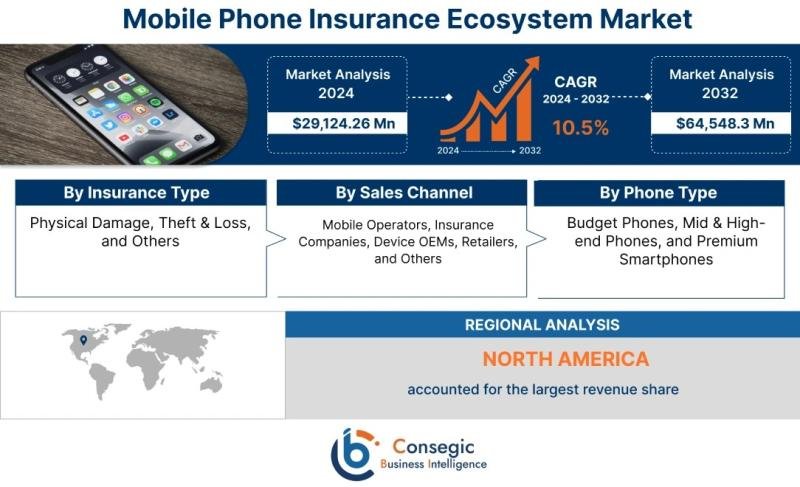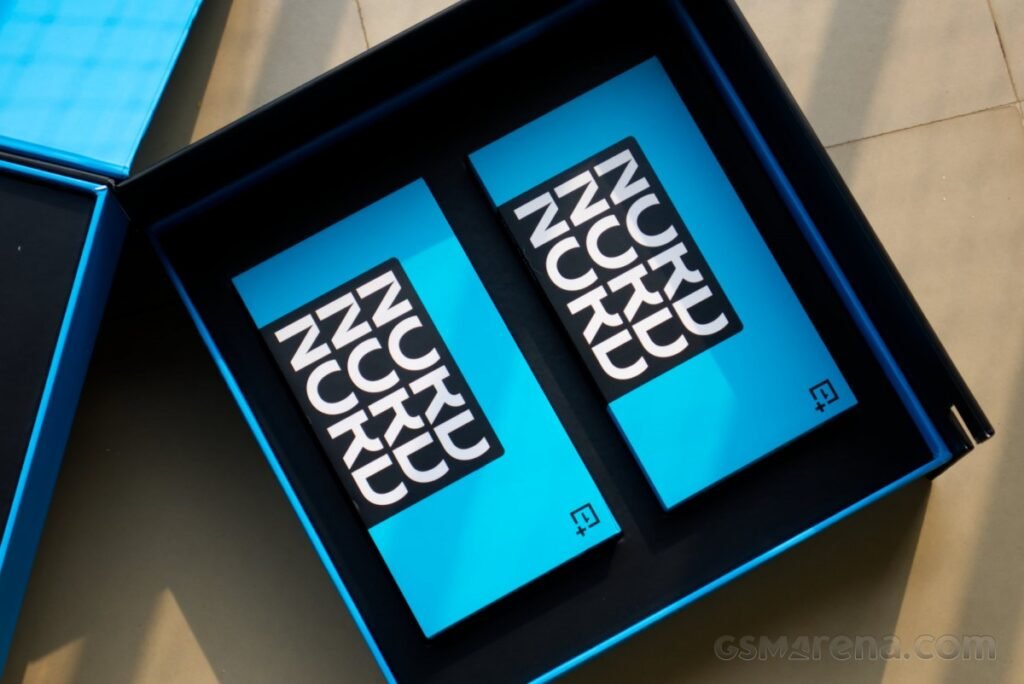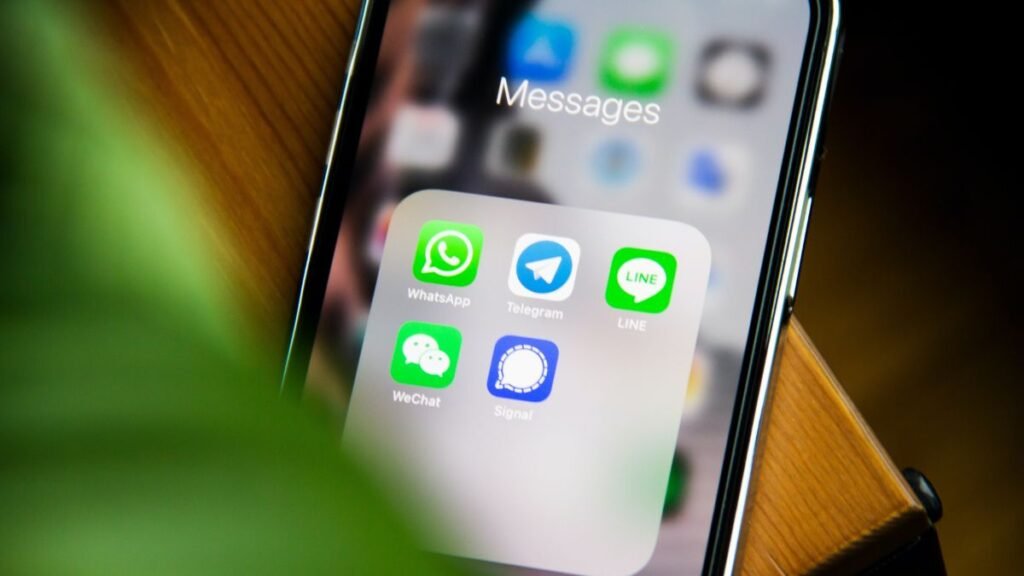Business reporter

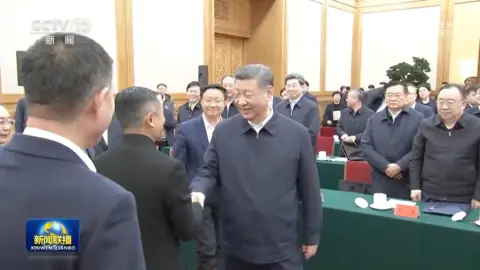 CCTV
CCTVA meeting between Chinese president Xi Jinping and some of the country’s foremost business leaders this week has fuelled excitement and speculation, after Alibaba founder Jack Ma was pictured at the event.
The charismatic and colourful Mr Ma, who was one of China’s most prominent businessmen, had withdrawn from public life after criticising China’s financial sector in 2020.
His reappearance at Monday’s event has sparked a wave of discussion, with experts and analysts wondering what it means for him, China’s tech sector and the economy in general.
The response has been overwhelmingly positive – tech stocks as well as those of Alibaba rallied soon after the event.
So what are analysts reading into Mr Ma’s appearance alongside other high-profile guests – including DeepSeek founder Liang Wenfeng?
Is Jack Ma ‘rehabilitated’?
Analysts began looking for clues about the significance of the meeting as soon as Chinese state media started releasing pictures of the event.
“Jack Ma’s attendance, his seating in the front row, even though he did not speak, and his handshake with Xi are clear signs he has been rehabilitated,” China analyst Bill Bishop wrote.
Social media was abuzz with users praising Mr Ma for his return to the public spotlight.
“Congratulations [Jack] Ma for the safe landing,” said one user on Chinese social media platform Weibo.
“The comeback of [Jack] Ma is a shot in the arm to the current Chinese economy,” said another.
It is unsurprising that observers have attached so much significance to an appearance by Mr Ma.
Before his disappearance from public life in 2020 – following comments at a financial conference that China’s state-owned banks had a “pawn-shop mentality” – Mr Ma was the poster boy for China’s tech industry.

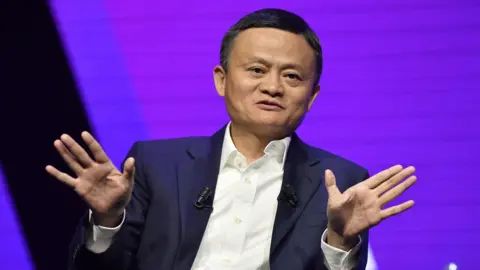 Reuters
ReutersAn English teacher with no background in computing, Mr Ma co-founded Alibaba in his apartment more than two decades ago after convincing a group of friends to invest in his online marketplace.
He went on to build one of China’s largest tech conglomerates and become one of the country’s richest men.
That was before his “pawn shop” comment, when he also lamented the “lack of innovation” in the country’s banks.
It led to the cancellation of his $34.5bn (£27.4bn) stock market flotation of Ant Group, his financial technology giant.
This was seen at the time as an attempt by Beijing to humble a company that had become too powerful, and a leader who had become too outspoken.
Analysts agree that the fact he’s back in the spotlight, at a symposium where Xi Jinping himself presided, is a very good sign for Mr Ma.
Some caution, however, that the fact he was not among the speakers may show that he has not fully returned to the exalted status he once enjoyed.
Also, the lack of coverage his attendance received in Chinese media outlets seems to confirm he has not been completely rehabilitated.
Is the crackdown on the tech industry over?
Xi Jinping told participants at the symposium that their companies needed to innovate, grow and remain confident despite China’s economic challenges, which he described as “temporary” and “localised”.
He also said it was the “right time for private enterprises and private entrepreneurs to fully display their talents”.
This has been widely interpreted as the government telling private tech firms that they too are back in good graces.
Mr Ma’s downfall had preceded a broader crackdown on China’s tech industry.
Companies came to face much tighter enforcement of data security and competition rules, as well as state control over important digital assets.
Other companies across the private sector, ranging from education to real estate, also ended up being targeted in what came to be known as the “common prosperity” campaign.
The measures put in place by the common prosperity policies were seen by some as a way to rein in the billionaire owners of some of China’s biggest companies, to instead give customers and workers more of a say in how firms operate and distribute their earnings.
But as Beijing imposed tough new regulations, billions of dollars were wiped off the value of some of these companies – many of them tech firms – rattling international investors.
This, along with a worsening global economy that was affected by the pandemic as well as Russia’s invasion of Ukraine, has contributed to considerable changes in China’s economic situation.
Growth has slowed, jobs for the country’s youth have become more scarce and, amid a property sector downturn, people are not spending enough.
As rumours that Mr Ma would attend Monday’s meeting began to spread, so did a glimmer of hope. Richard Windsor, director of technology at research firm Counterpoint, said Mr Ma’s presence would be a sign that China’s leadership “had enough of stagnation and could be prepared to let the private sector have a much freer hand”.
Aside from Mr Ma and Mr Liang, the list of guests also included key figures from companies such as telecommunications and smartphone firm Huawei, electric-vehicle (EV) giant BYD, and many others from across the tech and industrial sectors.
“The [guest] list showcased the importance of internet/tech/AI/EV sectors given their representation of innovation and achievement,” said a note from market analysts at Citi.
“[It] likely indicates the importance of technology… and the contribution of private enterprises to the development and growth of China’s economy.”
Those present at the meeting seemed to share that sentiment. Lei Jun, the chief executive of consumer electronics giant Xiaomi, told state media that he senses the president’s “care and support” for businesses.
Is it because of US sanctions?
The symposium took place after the country experienced what some observers have described as a “Sputnik moment”: the arrival of DeepSeek’s disruptive R1 artificial intelligence (AI) model at the end of last month.
Soon after its release, the Chinese-made AI chatbot rose through the ranks to become one of the most downloaded in the world. It also triggered a sudden sell-off of major US tech stocks, as fears mounted over America’s leadership in the sector.
Back in China, the app’s global success has sparked a wave of national pride that has quickly spread to financial markets. Investment has been pouring into Chinese stocks – particularly those of tech companies – listed in Hong Kong and mainland China.
Investment banking giant Goldman Sachs has also upgraded its outlook for Chinese stocks, saying rapid AI adoption could boost companies’ revenues and attract as much as $200bn of investment.
But the biggest significance of this innovation was that it came as a result of DeepSeek having to innovate due to a ban on the export of advanced chips and technology to China.

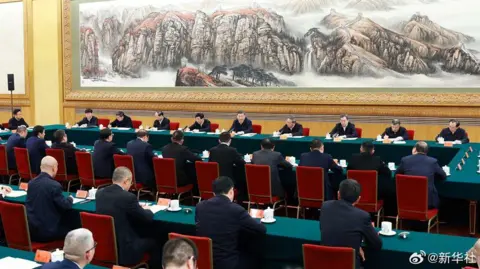 Xinhua
XinhuaNow, with Trump back in the White House and his fondness of trade tariffs, Mr Xi may have found it necessary to recalibrate his approach to China’s entrepreneurs.
Instead of a return to an era of unregulated growth, some analysts believe Monday’s meeting signalled an attempt to steer investors and businesses toward Mr Xi’s national priorities.
The Chinese president has been increasingly emphasising policies that the government has referred to as “high-quality development” and “new productive forces”.
Such ideas have been used to reflect a switch from what were previously fast drivers of growth, such as property and infrastructure investment, towards high-end industries such as semiconductors, clean energy and AI.
The goal is to achieve “socialist modernisation” by 2035 – higher living standards for everyone, and an economy driven by advanced manufacturing and less reliant on imports of foreign technology.
Mr Xi knows that to get there he will need the private sector fully on board.
“Rather than marking the end of tech sector scrutiny, [Jack Ma’s] reappearance suggests that Beijing is pivoting from crackdowns to controlled engagement,” an associate professor at the University of Technology Sydney, Marina Zhang told the BBC.
“While the private sector remains a critical pillar of China’s economic ambitions, it must align with national priorities – including self-reliance in key technologies and strategic industries.”






